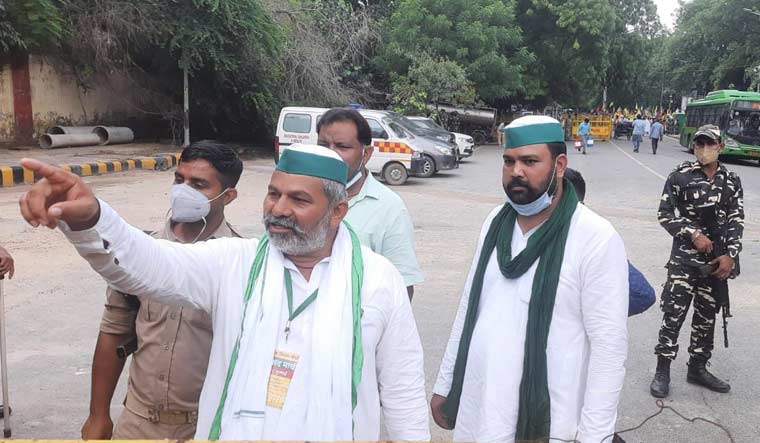Parliament session may just have breathed a new life into the nine-month-long farmers' protests that were in danger of fading into irrelevance. Both the bonafide one of the Indian legislature within the cosy confines of its colonial colonnades, as well as the mock protest one being staged by agitating farmers at Jantar Mantar in the national capital, starting today.
As Delhi’s LG as well as Disaster Management Authority reluctantly gave permission to hold a nearly month-long sit-in albeit with stringent caveats—numbers to be restricted to 200, all of them vetted and their photocopied IDs hung around their necks as if at some police line-up—the question loomed large whether the movement was withering out, of whether ironically the very politics that was trying to put it out could give it an extended breath of life.
The latest novel protesting method by the beleaguered farmers involve holding a ‘monsoon session of the parliament’ right at Jantar Mantar, deliberating on many topics of concern to them. For example, day one involved debating on various aspects of the APMC Bypass Act. Samyukta Kisan Morcha (SKM) calls this new front it has opened ‘deliberative democracy… for strengthening citizen voices in India”.
“(It is) an extreme initiative to make the Modi govt wake up & learn the ground reality of Farm laws,” according to SKM.
The number of Delhi Police and allied security personnel at the venue, as well as across the national capital, and even beyond its border, far outnumbered the protesters allowed at the site. In fact, their credentials were checked and were transported from the Delhi-Haryana border in Singhu, where hundreds of protesters have been camping since the start of the agitation against the three farm laws passed by the government last year.
In fact, tempers flared up at Singhu border earlier in the day as the buses which were to take the protesters from Singhu Border to Jantar Mantar were held up by Delhi Police. However, it was resolved soon, with SKM leaders at pains to point out that day one was “completely disciplined and orderly”. BJP’s newly anointed minister Meenakshi Lekhi’s reference to farmers as ‘hooligan’ also brought about a sharp retort from farmer leaders both online and offline.
While the untoward incidents on Republic Day might have been behind the all pervasive security net cast across the national capital region, it forced farmer leader Rakesh Tikait to quip, “Farmers are ann datas to the nation, why are we being treated like terrorists?”
“Delhi Police attempts to stifle democracy even after the Kisan Sansad starts (with) media kept away from farmers parliament proceedings—shameful act,” condemned a statement by the SKM on Thursday evening. The protesters peeve was the many barricades erected, which kept the media away from the proceedings.
The day-long event—the whole ‘parliament’ sessions are expected to continue till August 19—also saw an array of VIP visitors, from activist-politician and one-time psephologist Yogendra Yadav, 20 MPs from Kerala who came to express their solidarity as well as Punjabi singers and actors.
Day one of Parliament session, the original one that is, was witness to the fact that the politicians had not forgotten the farmer agitation one bit. While many parties raised the issue, ruling BJP’s ally in Punjab, the Shiromani Akali Dal, was conspicuous by popping up with its placard-laden protest at the Parliament doors, in pouring rain. Its BJP association having put it on the back pedal all this while, it was clear that SAD was going to jump into the issue for what it's worth, considering that Punjab goes to the polls in a few months. Aiding it would definitely be the fact that Captain-Sidhu faction fighting has reached a peak in ruling Congress party, which was supposedly taking total advantage of the mood in the riparian state all this while.
But the question remains whether this new stage could catalyse the agitation further, as also force the authorities into any rapproachement. As such, 11 rounds of talks between the government and the protesting farmers last winter spawned no solution whatsoever. Agriculture Minister Narendra Singh Tomar reiterated that his government was ready to hold discussions again, though the response from the farmers' side wasn’t immediately forthcoming.
In fact, the upcoming Punjab and UP assembly polls could be the final lifeline for the agitation, since no dispensation would want to squander its chances by irking the farmers (and by extension, the voters in Punjab as well as UP). Tikait’s last hope is also this, even as he struggles to smoothen the supposed rift between the farmers from Punjab vis-a-vis those from western UP.





